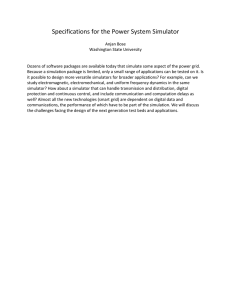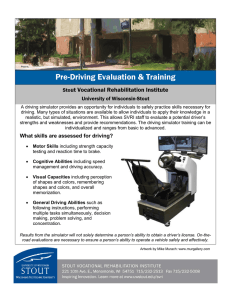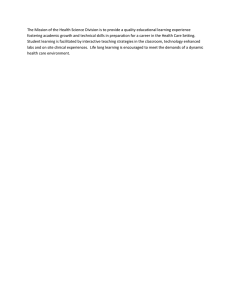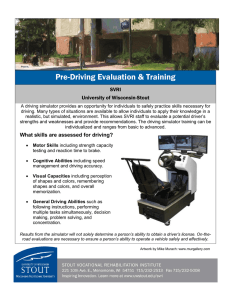CSC-330 and CSC 540 - Organization of Computer Systems
advertisement
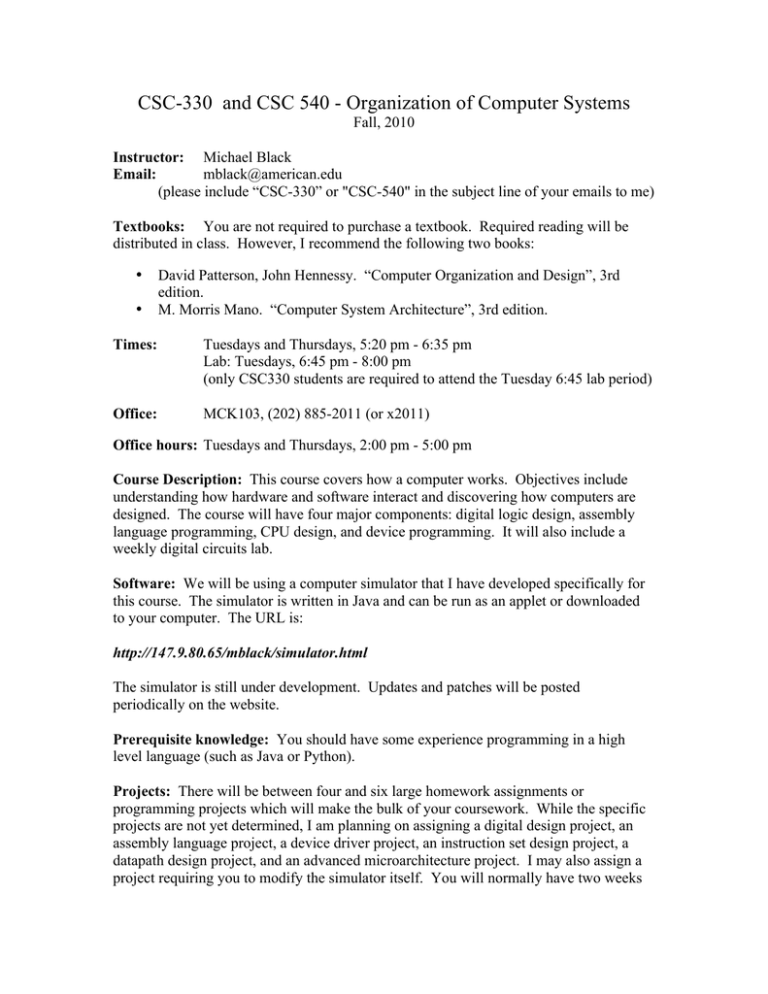
CSC-330 and CSC 540 - Organization of Computer Systems Fall, 2010 Instructor: Michael Black Email: mblack@american.edu (please include “CSC-330” or "CSC-540" in the subject line of your emails to me) Textbooks: You are not required to purchase a textbook. Required reading will be distributed in class. However, I recommend the following two books: • • David Patterson, John Hennessy. “Computer Organization and Design”, 3rd edition. M. Morris Mano. “Computer System Architecture”, 3rd edition. Times: Tuesdays and Thursdays, 5:20 pm - 6:35 pm Lab: Tuesdays, 6:45 pm - 8:00 pm (only CSC330 students are required to attend the Tuesday 6:45 lab period) Office: MCK103, (202) 885-2011 (or x2011) Office hours: Tuesdays and Thursdays, 2:00 pm - 5:00 pm Course Description: This course covers how a computer works. Objectives include understanding how hardware and software interact and discovering how computers are designed. The course will have four major components: digital logic design, assembly language programming, CPU design, and device programming. It will also include a weekly digital circuits lab. Software: We will be using a computer simulator that I have developed specifically for this course. The simulator is written in Java and can be run as an applet or downloaded to your computer. The URL is: http://147.9.80.65/mblack/simulator.html The simulator is still under development. Updates and patches will be posted periodically on the website. Prerequisite knowledge: You should have some experience programming in a high level language (such as Java or Python). Projects: There will be between four and six large homework assignments or programming projects which will make the bulk of your coursework. While the specific projects are not yet determined, I am planning on assigning a digital design project, an assembly language project, a device driver project, an instruction set design project, a datapath design project, and an advanced microarchitecture project. I may also assign a project requiring you to modify the simulator itself. You will normally have two weeks to complete a project. At my discretion, I may permit projects to be completed in teams of two. Projects should be submitted electronically using Blackboard. Projects will be evaluated primarily on correctness, but also on creativity and effort. Homework: I will periodically assign smaller homework assignments. These should be completed individually and will normally be due within a week. Labs: There will be approximately 6 labs which will be held on Tuesdays. Labs will require you to build various digital circuits, including a small computer. You must complete all labs in pairs. Labs may require a postlab or prelab report. Lab attendance is mandatory; missed labs cannot be made up. Journal: I am very interested in your experience and subjective opinions using the simulator. Consequently, I will be requiring each of you to maintain a journal. This can be either written in a notebook or typed electronically (using Blackboard). In your journal, you should write an entry for each project, recording the following: • Your experience using the simulator for that project, your likes and dislikes • Bugs you encounter in the simulator software • Ideas you have for revisions, extra features, user interfaces, and new projects The journal will be graded entirely on effort. I expect you to write 1-2 pages per project. Grading: CSC330 Projects: Labs: Homeworks: Journal: Final Exam: 40% 30% 5% 5% 20% CSC540 Projects: Homeworks: Journal: Final Exam: 57% 7% 7% 29% 100-93 A 92-90 A- 89-87 B+ 86-83 B 82-80 B- 79-77 C+ 76-73 C 72-70 C- 69-60 D 59-0 F Late Policy: Homework is due at the beginning of the class period one week after they are assigned. Projects must be submitted on the due date, unless I approve prior arrangements. Missed exams may not be made up. If a true emergency forces you to miss an exam, permission to be excused must be sought in writing from me. If granted, the final exam score will replace the score of the missed exam. Academic Integrity: Plagiarism and academic misconduct are defined in the University’s Academic Integrity Code. You should be familiar with what constitutes academic dishonesty. In particular, you should observe the following rules: • • • • Collaboration on homework and on projects outside of your project group is forbidden. Any information taken from the internet, books, or anywhere else for use on your assignments must be cited. You are permitted to discuss your work with other students at the conceptual level only. Your code must be entirely your own. You are not permitted to share code or use code obtained from the internet in your work. Unless otherwise stated, all exams will be closed-book, closed-notes. Instances of plagiarism may be reported and could result in disciplinary action. Feedback: I am eager to receive suggestions on how I can improve this course. If you have any comments, please feel free to tell me, either in person, by email, or anonymously. Approximate Course Outline (subject to modifications) Date Subject Tu 8/24 Anatomy of a computer Th 8/26 History of computers Tu 8/31 Abstraction Model Lab 0: Using equipment Th 9/2 Boolean logic Tu 9/7 Boolean algebra Lab 1: Gates Th 9/9 Adders, muxes, flip-flops, registers Tu 9/14 State machines Lab 1: Gates Th 9/16 High level programming Tu 9/21 Assembly instructions Lab 2: Adders and counters Th 9/23 Assembly programming Tu 9/28 Assembly programming Lab 2: Adders and counters Th 9/30 System calls and interrupts Tu 10/5 Device drivers Lab 3: Traffic light controller Th 10/7 Console Tu 10/12 Communication Lab 3: Traffic light controller Th 10/14 Assembling, linking and loading Tu 10/19 Instruction encoding Lab 3: Traffic light controller Th 10/21 Datapath Tu 10/26 Datapath Lab 4: 8085 computer Th 10/28 Control Tu 11/2 Control Th 11/4 Quantifying performance Tu 11/9 Pipelining Lab 4: 8085 computer Th 11/11 Advanced microarchitectures Tu 11/16 Advanced microarchitectures Lab 5: Choose your own project Th 11/18 Memory hierarchy and cache Tu 11/23 Cache Lab 5: Choose your own project Tu 11/30 Storage and DMA Lab 5: Choose your own project Th 12/2 Power * Note: one or two classes in mid-October may be canceled or converted to a guest lecture
